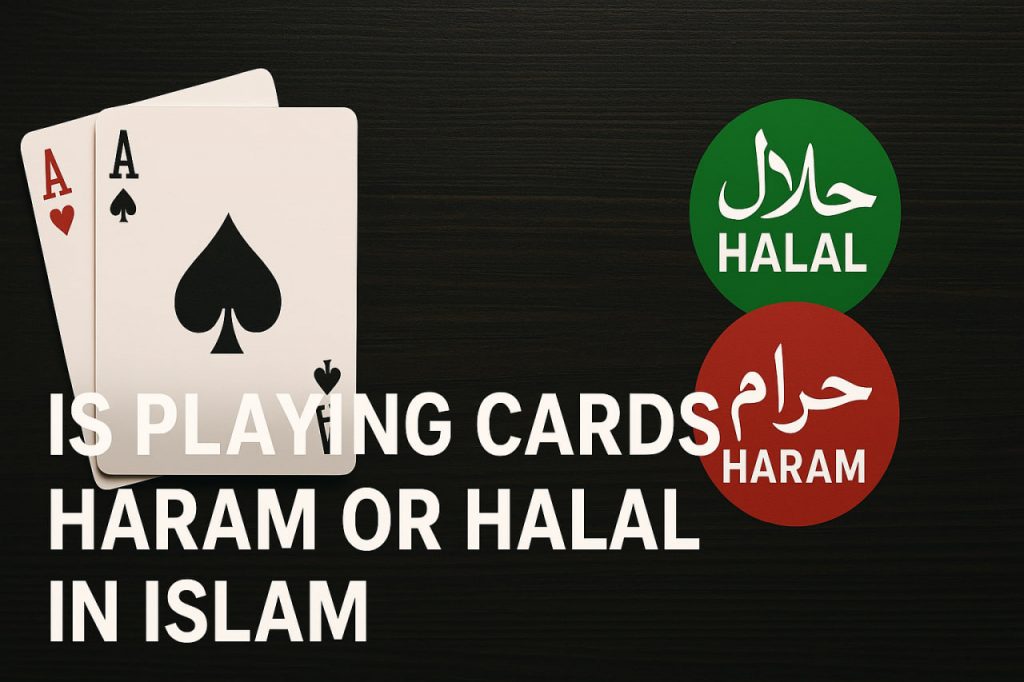Is Playing Cards Haram Or Halal In Islam?

The question of whether playing cards is haram or halal in Islam has sparked considerable debate among scholars and Muslims alike. With various interpretations rooted in the Quran, Hadith, and scholarly consensus, it’s essential to explore the context, intentions, and impact of playing cards on one’s faith and daily life. As recreational activities become increasingly common and diverse in modern societies, understanding the Islamic rulings related to them is more important than ever. What may be a simple leisure activity in one culture may carry different implications in another, and Islam’s holistic approach considers such nuances in its rulings.
Islam is a religion that places a high emphasis on intention (niyyah), the effects of one’s actions, and their alignment with spiritual and moral values. Therefore, when it comes to recreational activities like playing cards, many nuances must be considered. What may be harmless entertainment to one person could become a spiritual trap for another, depending on how and why it is pursued. Moreover, since entertainment today is easily accessible through various forms—digital, physical, and social—it becomes even more critical to apply Islamic principles consistently.
In this article, we aim to answer commonly asked questions such as:
- Is playing cards haram?
- Is playing cards halal?
- Are playing cards haram if there’s no gambling?
- Is card games haram in general or under certain conditions?
Let’s explore these questions in-depth, while looking at Islamic jurisprudence, scholarly views, and real-life examples from both traditional and modern contexts. We’ll also examine how Islamic ethics encourage Muslims to adopt beneficial habits, avoid doubtful matters, and preserve the integrity of their character in every aspect of life.
Understanding the Islamic Perspective
Islam promotes activities that nurture the soul, body, and mind while discouraging those that lead to harm, addiction, or deviation from religious obligations. The Shariah (Islamic law) is designed to preserve five key objectives: religion, life, intellect, lineage, and wealth. When evaluating whether playing cards is haram or halal, these maqasid (objectives) are applied to assess the potential harm or benefit of the activity. Entertainment is allowed in Islam, but not at the cost of spiritual, physical, or social well-being.
1. Gambling and Wagering
The most common reason why playing cards is considered haram is its association with gambling (“maysir” or “qimar”), which is explicitly and repeatedly prohibited in the Quran:
“O you who believe! Intoxicants and gambling, and (dedication of) stones, and (divination by) arrows, are an abomination of Satan’s handiwork. So avoid it that you may prosper.” – [Surah Al-Ma’idah, 5:90]
“Satan seeks only to cause enmity and hatred among you with intoxicants and gambling, and to hinder you from the remembrance of Allah and from prayer. Will you not then abstain?” – [Surah Al-Ma’idah, 5:91]
These verses make it clear that gambling is not only sinful, but also a means through which Satan aims to distract people from their religious obligations. Since many card games historically originated in gambling contexts (such as poker and blackjack), their modern usage must be carefully scrutinized.
Today, gambling has also taken digital forms, with many online card games including microtransactions, tokens, and virtual currencies that mirror real-world gambling mechanisms. This further complicates the ruling and necessitates cautious evaluation.
If playing cards involves gambling, whether through betting money, prizes, or digital currency in online games, the ruling is unanimous and non-negotiable: It is haram.
2. Addiction and Wasting Time

Even without gambling, card games can become addictive and distract from more meaningful or religious duties like prayer, family obligations, and work. Islam advises moderation and wise use of time, as every moment is an opportunity to seek knowledge, do good, or remember Allah.
“The feet of the son of Adam will not move on the Day of Judgment until he is asked about his life and how he spent it…” – [Hadith, Tirmidhi]
Spending several hours daily on games, especially at the expense of religious duties such as salah, Quran reading, or family responsibilities, is considered wasteful (laghw) and disliked (makruh). While occasional entertainment is allowed, when it becomes excessive or harmful, the permissibility is withdrawn.
In extreme cases, addiction to games has led to psychological issues, social isolation, and even financial loss. Islamic ethics strongly discourage habits that lead to such negative consequences, even if they start out as permissible activities.
3. Content and Environment
The permissibility of an action in Islam also depends on the setting and the content involved. For example:
- Playing in bad company, or where there is music, alcohol, foul language, or inappropriate behavior, may render the act impermissible even if the game itself is neutral.
- Games that involve haram themes or actions (e.g., promoting magic, lust, crime, or violence) are not suitable from an Islamic point of view.
Islam emphasizes guarding the senses from evil influences, as they are gateways to the heart. The Prophet Muhammad (peace be upon him) warned against bad company and environments that invite sin.
“A man is upon the religion of his friend, so let one of you look at whom he befriends.” – [Hadith, Abu Dawood]
Even seemingly innocent card games can become problematic if they are played in a context that promotes idle behavior, neglect of worship, or inappropriate interactions between genders. Hence, the full context matters in determining the ruling.
4. Intent and Moderation
Intent plays a critical role in determining whether a card game is halal or haram. If card games are played for mental stimulation, bonding with family, or educational purposes, without gambling, bad influence, or obsession, then some scholars consider it halal or at least permissible (mubah).
Examples of such uses include:
- Playing memory games with children using cards
- Math-based card games for educational purposes
- Social games among family members after dinner
- Islamic-themed card games designed to teach the deen
- Cooperative team-based card games that promote critical thinking and communication
As long as these activities are kept in moderation, they may even be encouraged as a way to strengthen family ties and enhance intellectual development. The Prophet (peace be upon him) allowed physical and mental recreational activities that aligned with Islamic values.
“Indeed, your body has a right over you…” – [Hadith, Bukhari]
Being active, balanced, and purposeful in how we spend our time reflects ihsan (excellence) in our daily life.
Play Halal-Approved Card Games Selected by Our Team
Many card games online are turned into gambling by adding real-money stakes, prize pools and chance-based profit. From an Islamic perspective, this makes them clearly haram. Our team has reviewed various card game formats and selected halal-friendly options that keep the strategy and fun but remove the betting and cash rewards.
These Shariah-verified card games focus on skill, logic and social interaction, making them suitable for Muslims who want clean, risk-free entertainment.
- ✔ Card games reviewed and Shariah-checked
- ✔ No money, no betting, no gambling-based prizes
- ✔ A halal-conscious way to enjoy modern card gameplay
Note: This recommendation is based on our team’s Shariah analysis and is provided for educational purposes only. For personal religious rulings, please consult a qualified Islamic scholar.
Playing Cards in Islam – Halal or Haram?
| Scenario | Ruling | Explanation |
|---|---|---|
| Playing cards with gambling | Haram | Directly involves gambling, clearly forbidden in Islam. |
| Playing casually without money | Makruh / Mubah | Permissible if no harm, addiction, or distractions occur. |
| Playing excessively and missing prayers | Haram | Leads to neglect of religious duties. |
| Playing in bad company or sinful environments | Haram | Surroundings play a role in defining the permissibility. |
| Educational card games for learning | Halal / Mubah | Intention matters; no haram elements involved. |
| Playing during family time without neglect | Mubah | Permissible as a form of light, beneficial entertainment. |
| Playing online games with strangers | Discouraged | May expose one to inappropriate speech or content. |
| Playing competitive games without stakes | Mubah | If conducted respectfully and moderately. |
| Playing cards during gatherings with dhikr | Discouraged | May reduce the spiritual value of the gathering. |
| Playing games that promote Islamic learning | Halal | Encouraged when serving an educational purpose. |
| Playing games with fantasy/magical content | Discouraged / Haram | Depending on the content’s alignment with Islamic teachings. |
Scholarly Opinions on Playing Cards

Islamic scholars from different schools of thought have offered varying perspectives based on context, cultural norms, and evolving circumstances. This reflects the depth and flexibility of Islamic jurisprudence in addressing contemporary issues.
- Majority Opinion: Playing cards is haram if it involves gambling, leads to sinful behavior, or distracts from obligatory acts of worship.
- Moderate Opinion: If there is no exchange of money, no addiction, and the setting is free from haram influences, card games can be permissible as occasional, clean entertainment.
- Conservative Opinion: It’s better to avoid playing cards altogether to steer clear of doubtful matters. This opinion is based on the Hadith: “Leave that which makes you doubt for that which does not make you doubt.” [Tirmidhi]
Contemporary scholars have emphasized the role of parental guidance, digital platforms, and the evolving nature of games. While classical scholars did not address mobile games, modern fatwas consider the underlying principles to evaluate their permissibility.
Scholars also recommend community education efforts to raise awareness of what constitutes halal entertainment and how Muslims, especially youth, can navigate their leisure time responsibly in a fast-paced, media-heavy world.
Some scholars further advise Muslims to substitute such games with more constructive activities like physical sports, Islamic trivia, or other halal forms of recreation that enrich the mind and body. Encouraging youth to participate in masjid events, outdoor games, or group activities that include learning components is often seen as a better alternative.
Final Verdict: Is Playing Cards Haram Or Halal?
So, is playing cards haram or halal in Islam? The answer is not a simple yes or no. It depends on your intentions, your actions, your environment, and how you engage with the game. Islamic rulings are not just about the activity itself, but about its consequences, context, and effect on one’s faith and life.
Ask yourself:
- Am I gambling or risking money?
- Am I missing prayers or obligations due to playing?
- Am I playing in a harmful or sinful environment?
- Am I using this game to relax, learn, or bond with family?
- Is the game distracting me from my responsibilities as a Muslim?
- Would I be comfortable engaging in this activity if the Prophet (PBUH) saw me?
If your answer is positive and free from sin, most scholars agree that playing card games may not be haram, but caution is advised, especially if there is even a remote risk of slipping into addiction, neglect, or sin. Always prioritize your spiritual growth, health, and responsibilities.
Conclusion
While card games are not inherently haram, the way they are played can make them either permissible or sinful. Like many modern issues, it requires reflection, knowledge, and personal responsibility. As Muslims, we are encouraged to avoid the doubtful, limit the trivial, and focus on that which brings benefit. What matters most is preserving one’s faith, time, and family ties.
To conclude:
- Avoid gambling or harmful environments.
- Keep your intentions pure and your time managed.
- Encourage halal alternatives that enrich your mind and bond you with your family.
- When in doubt, consult a trusted scholar.
- Be mindful of moderation, and don’t allow leisure to overpower worship.
- Inspire others by modeling responsible and ethical recreation choices.
So next time someone asks, “Is playing cards haram?” or “Is card games haram in Islam?”, you’ll know there isn’t a one-size-fits-all answer – but informed, faith-guided decisions can help you choose wisely and stay aligned with Islamic principles.
FAQs
Not necessarily. It depends on your intention and usage. If the game is free from gambling and sinful environments, it may be permissible.
Generally considered halal if no sin is involved and the purpose is to teach or enhance learning.
If there is no gambling, no inappropriate behavior, and no neglect of duties, many scholars would not label it haram.
Yes, especially if the games are educational, clean, and supervised by parents to ensure moderation and propriety.
It depends on the game and platform. If it involves gambling, inappropriate ads, or chatting with strangers in un-Islamic ways, it may be haram or discouraged.
Games that promote shirk, magic, or immoral content are best avoided, even if they do not involve gambling.
Preferably not, unless the games are Islamic-themed, brief, and do not interfere with the main purpose of the event.
Yes, educational games based on Quranic stories or Islamic history can be a fun and engaging way to teach young Muslims.

User Reviews
I grew up loving card games but stayed away from most online versions because they turned into gambling. This site helped me find Shariah-checked card games that feel fun and completely halal. Really thankful for this guidance.
Your halal card games recommendation is amazing. I appreciate how clearly you explain what makes some card apps haram and then point us to alternatives that remove betting and money. Perfect for mindful Muslim players.
I am very happy I found this page. It gave me a safe list of card games that are Shariah-verified and focus on skill rather than gambling. Now I can play without worrying about crossing Islamic limits.
Before discovering this site, I didn’t know which card games were actually safe from an Islamic point of view. The halal card options recommended here are exactly what I needed as a practicing Muslim.